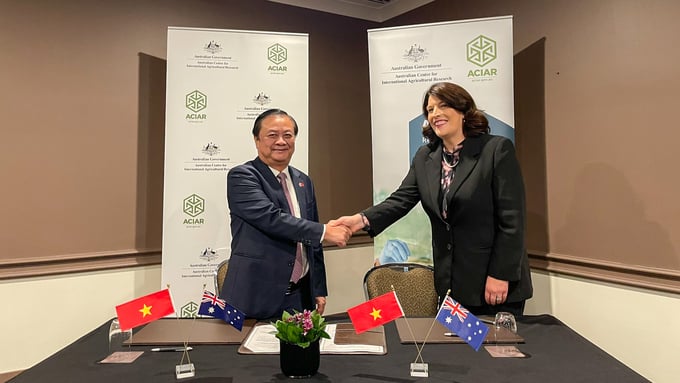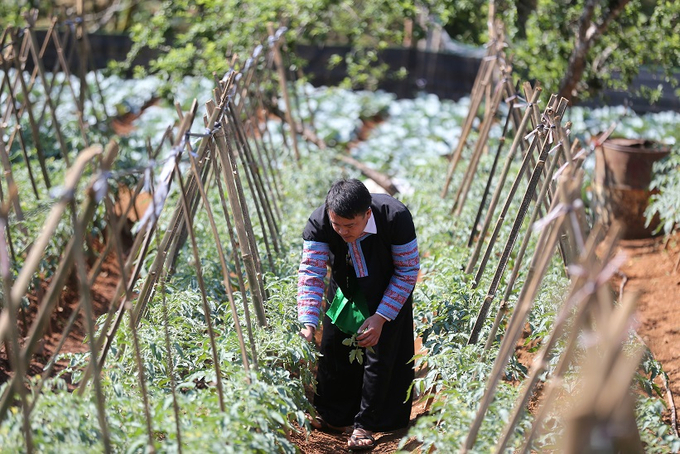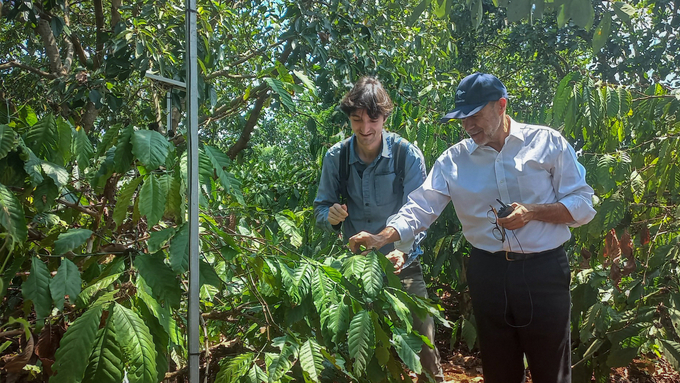May 30, 2025 | 07:53 GMT +7
May 30, 2025 | 07:53 GMT +7
Hotline: 0913.378.918
May 30, 2025 | 07:53 GMT +7
Hotline: 0913.378.918
In March 2024, Australia and Vietnam officially upgraded their relationship to a Comprehensive Strategic Partnership, marking the highest level of diplomatic relations after 50 years of cooperation. On this occasion, the Vietnam Ministry of Agriculture and Rural Development (MARD) and the Australian Center for International Agricultural Research (ACIAR) signed a Memorandum of Understanding to promote scientific research for the development of agriculture, forestry and fisheries.
This event reaffirmed the ACIAR - Vietnam Research Collaboration Strategy (2017 - 2027), with specific orientations for agricultural development in the Northwest, Central Highlands and Mekong Delta. These are regions with potential for agricultural development, but are also subject to many challenges from disasters, climate change, and natural resource depletion, and are home to many smallholder farmers, among them are ethnic minorities.

Minister of Agriculture and Rural Development Le Minh Hoan and ACIAR Director General, Prof. Wendy Umberger, signed a Memorandum of Understanding on cooperation to promote scientific research for agricultural development in March 2024. Photo: ICD.
The ACIAR Vietnam program supports research collaboration to provide evidence-based solutions to help farmers have better production and practice solutions. According to Ms. Nguyen Thi Thanh An - Country Manager of ACIAR Vietnam, since 2017, ACIAR has invested about 4.5 million to 6 million AUD each year for research collaboration in Vietnam or related to Vietnam.
“I am very happy to see positive changes in these localities in recent times,” Ms. An stated.
In the Northwest region, through ACIAR resources, domestic and international scientists have worked with farmers and local authorities to develop safe vegetable cultivation practices, agroforestry, and temperate fruit growing models. ACIAR pays special attention to cultivation techniques to preserve sloping land, raise profitable beef cattle, ensure livelihoods for people, and help localities develop sustainably in the direction of suitable ecological agriculture.
Unlike 10 years ago, farmers in Moc Chau, Van Ho (Son La province), Sa Pa, Bac Ha (Lao Cai province) are now proficient in producing safe vegetables. They have supplied, expanded specialized vegetable cooperatives, and succeeded in distant markets such as Hanoi, Hai Phong and other provinces.

Vegetable garden in Moc Chau, Son La supported by ACIAR project. Photo: Australian Embassy in Vietnam.
The ACIAR Vietnam representative gave the example of the story of Ms. Dinh Thi Xoa, 61 years old in Van Ho (Son La province) - one of the first women to participate in the Australian-funded vegetable research and development project.
At first, the 7 members of the Van Ho Safe Vegetable Cooperative encountered difficulties because they were unfamiliar with the process of growing and supplying safe vegetables. With technical support from the project, Ms. Xoa educated the group on how to grow vegetables to comply with VietGAP standards.
Thanks to this, members have gradually changed their farming methods, from writing reports to composting manure, using fertilizers and pesticides properly and applying them at the right time before harvesting, and have succeeded in growing many types of leafy vegetables.
In the first 3 years of participating in the project, members increased their income 10 times compared to growing corn and rice as before in the same area. Some farmers like Mr. Vang A Sa, a Mong ethnic, later developed new cooperatives, buying trucks to transport agricultural products to major supermarkets in Hanoi such as BigC and Aeon regularly.
Project staff commented that the Mong people are a very close-knit community. Seeing the economic efficiency, farmers in the area actively learn from each other to expand the scale of VietGAP vegetable production.
Similarly, ACIAR’s activities in the Central Highlands and the Mekong Delta prioritize smallholder development opportunities. But the work in these two regions focuses more on addressing climate change-related issues, such as water-limited farming in the Central Highlands or salinity intrusion in the Mekong Delta.
In addition, these are export-oriented production areas, so connecting with businesses and understanding market demand is also focused on key industries such as coffee, pepper, rice, and seafood.

Australian Ambassador Andrew Goledzinowski (right) visits the project Improving the sustainability, productivity and economic value of coffee and pepper farming systems and value chains in the Central Highlands (V-SCOPE). Photo: ACIAR.
In the Central Highlands, the close connection between farmers, businesses and researchers such as the Ea Tan cooperative with Simexco DakLak Coffee Export Company in the project has helped farmers improve their capacity, have more information about the market, and are now boldly investing in perfecting roasting and packaging activities to improve production quality and confidently pursue the path of specialty coffee.
Rice farmers in the Mekong Delta, facing the challenges of climate change, have a different story. Some rice-growing areas are now experiencing drought and salinity more frequently, making rice cultivation no longer suitable. Research on rice-shrimp rotation, or replacing rice with short-term crops that are more tolerant to salinity, has been conducted in the fields. Thanks to these experiments, farmers in some areas of Ca Mau and Bac Lieu know how to treat the soil, wash away the salinity after the shrimp crop to grow rice.
Farmers in Soc Trang and Hau Giang are experimenting with more salt-tolerant crops such as corn, beets, and watermelons, using soil moisture and salinity management methods. Many farmers want to experiment with growing beets, a salt-tolerant crop that can generate 20 times more income than rice.
In rice-growing areas such as An Giang and Kien Giang, in addition to in-depth research, the ACIAR project has become a bridge between smallholder farmers and the SunRice Group - a famous Australian rice exporter. Farmers who practice good integrated pest management and meet maximum residue limits (MRLs) also receive incentives from the company in addition to the agreed price.
The Country Manager of ACIAR Vietnam affirmed: “The history of cooperation, trust and mutual understanding between the parties has helped us achieve the achievements we have today. The strategy of ACIAR - Vietnam is based on the needs and research needs of Vietnam combined with the strengths of Australian agricultural research and development”.
In order for the ACIAR - Vietnam Cooperation Strategy to achieve its goals by 2027, ACIAR representatives proposed that the Ministry of Agriculture and Rural Development coordinate to update the priority list annually to ensure the timeliness and urgency of new projects.

ACIAR hopes that projects in Vietnam will attract more partners in different fields. Photo: Quynh Chi.
Joint investment is also an important point in the Strategy. Currently, most of the projects under the Agricultural Economics Research Program (AGB) of ACIAR Vietnam have been co-invested by the Ministry of Agriculture and Rural Development or enterprises. However, the number of these projects is still modest, accounting for only about 1/3 of the total number of current projects. ACIAR hopes that along with proactively proposing issues requiring cooperation, the "joint investment" move will demonstrate Vietnam's priority commitment.
Finally, challenges such as climate change and the multi-layered relationship to solve economic development problems require research that takes a systematic, multi-disciplinary approach. ACIAR hopes that projects in Vietnam will attract more partners in different fields. The contribution of in-depth knowledge from many parties will help Vietnam and ACIAR achieve common goals.
Translated by Quynh Chi

(VAN) Ms. Nguyen Thi Dung, Deputy Director of Ngoc Hoang Cooperative, shared about the journey of bringing dragon fruit to Europe, achieving annual revenues in the billions of VND.

(VAN) Bamboo products from Thang Tho Bamboo Cooperative have reached many countries around the world, while also creating jobs for local workers.

(VAN) The Management Board of Con Dao National Park reported that a green sea turtle, tagged in the Philippines, has traveled thousands of kilometers to lay 84 eggs on Bay Canh Islet.

(VAN) Green technology is paving a new path for sustainable aquaculture in the Mekong Delta in particular and across the country in general, helping reduce emissions and adapt to climate change.

(VAN) On May 27, La French Tech Vietnam (the French startup and innovation community in Vietnam) held the French Tech Summit Vietnam 2025.
/2025/05/27/4731-2-223159_980.jpg)
(VAN) No votive paper, no styrofoam, no plastic bags, no plastic bottles, and no single-use plastic trays are the key rules tourists should keep in mind when visiting Con Dao.

(VAN) In the fight against plastic pollution, Vietnam has been demonstrating a proactive, pioneering, and active role in addressing the greatest environmental challenge today.